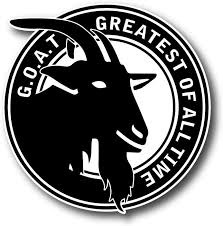Subjectivity & Objectivity of GOAT Claims
Briefest Philosophical Analysis
About the Author
Bryan Frances is the world’s only intellectual wisdom coach. He’s a former professor of philosophy & logic, doing research & teaching at universities in the US, UK, Europe, Asia, and the Middle East. He teaches you how to become the wisest thinker in the room—which is different from being the most knowledgeable or having the highest IQ. Contact for a free session.
Suppose you want to make a GOAT list: a list of the items that are the greatest of all time in some category. For many categories, we know that the list will be “subjective”. My GOAT list of movies will be different from yours, and there’s no objective fact of the matter as to who is right.
That’s what we say, and we’re right. But there’s objectivity too in GOAT lists. In this post I’ll talk about both subjectivity and objectivity, using baseball as a test case.
*****
In my view, the primary reason there usually is nothing even approaching consensus regarding answers to greatest-of-all-time questions has several parts. To a first approximation, here it is:
The phrase “greatest in the history of baseball” has no accessible, fully complete, meaning that determines what items (players, teams, achievements, and so on) are GOAT ones. It’s not like “tallest person in the house”, which has an accessible, fully determinate, meaning (or close enough to “fully”). With “tallest person in the house”, as soon as you understand it, you have a rule to follow to figure out which person it applies to. Whomever in the house has the greatest height wins. That’s not the case for “greatest in the history of baseball”. Even when you understand the latter phrase, you haven’t been given a useful rule, precise or not, for figuring out which things measure up.
When coming up with a GOAT list, we have to start with the incomplete meaning of “greatest of all time” that is standard for all English speakers. The terms such as “all time” have a meaning of some sort that doesn’t depend on my or your subjectivity. Call that incomplete meaning X. Next, we add some subjective, person-relative interpretive elements to X. Call the combination of those interpretive elements Y. We do this in order to get a more complete meaning, which is (X & Y). It’s the meaning (X & Y) that we can use to see which items qualify as GOAT ones.
In a group of people assessing GOAT items for a category they’re knowledgeable about, it’s almost always the case that they are, knowingly or unknowingly, adding different subjective elements Y in the previous step. These different Ys are often significantly different from one another. They are also mostly unconsciously chosen.
According to these different combinations of the incomplete meaning of “greatest of all time” plus our differing subjective elements, different items get to be the “greatest of all time”. In other words, since my Y1 is quite different from your Y2, my (X & Y1) is quite different from your (X & Y2). That means our GOAT criteria end up different—and not in just minor ways. So, we get significantly different GOAT lists.
The phrase “greatest of all time” isn’t boringly ambiguous like “bank” (river bank, financial institution, road that is horizontally tilted, bank of electrical equipment, snow bank), “child” (no matter how old you are, you are a “child” of someone, but that doesn’t mean you are a “child” in the young sense of that term), or “bat” (baseball bat, whip used by a jockey, flying mammal bat). The semantic incompleteness of “greatest of all time” is subtle and causes intricate problems, and occasionally fruitful exchanges, in communication and debate as we employ our differing subjective elements.
This makes the task of compiling the GOAT items look hopelessly subjective. But it’s not, is it? There is a ton of objectivity too.


